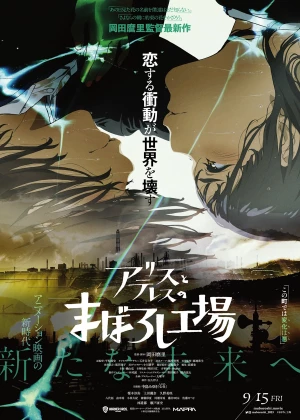Maboroshi

For years, anime studios have been trying to replicate the success of Ghibli, though lately there's been a noticeable shift from Ghibli (still hot property of course) to Shinkai. High-concept fantasy with a maximalist finish. It's not an easy thing, nor a cheap one to mimic, but it's nice when someone succeeds. Mari Okada and Seimei Kidokoro's Maboroshi [Alice to Therese no Maboroshi Kôjô] is one of the better attempts I've come across so far, and the good thing is that the film is readily available on Netflix, making this one of my more feasible recommendations.
![screencap of Maboroshi [Alice to Therese no Maboroshi Kôjô]](/thumbs/img/articles/1200xauto/maboroshi-1.webp)
Studio Mappa is quite big these days, but my experience with their work is limited. They grew at a time when I had already lost my interest in anime series and the ones I did try (full disclosure - none of them I finished) didn't exactly sweep me off my feet. So far I haven't discovered a clear signature in their output, but based on Maboroshi it's obvious they do have some talented people on board. No corners were cut when producing this anime, which is a rarity at a time when most anime features are little more than TV series extensions.
It's also nice to see there are still animes around that don't feel the need to force-feed everything to their audience. It's not that Maboroshi features the most complex fantasy setup, but you'd do best to pay attention early on, as the film leaves it up to the audience to figure out most of what is happening. And there's quite a bit going on in those first 30 minutes, even as the film feels quite relaxed. There are some denser moments of exposition scattered throughout and things get explained adequately, but not always before or right after something crucial happens.
One evening there's a major explosion in a small town's steel factory. After that, the village isn't quite the same, as it seems frozen in time. Once in a while cracks appear in the sky, which are closed up by streams of smoke shooting out of the steel factory. Inside the factory, there's a young girl who controls the fate of the entire village. When Masamune is tasked to care for the girl, he begins to suspect some people have been lying to the villagers, and he wants to help the girl escape. Bringing her back to her world might mean the end of the villagers and their little town though.
![screencap of Maboroshi [Alice to Therese no Maboroshi Kôjô]](/thumbs/img/articles/1200xauto/maboroshi-2.webp)
Like Shinkai, Okada and Kidokoro make sure they pay proper attention to the atmosphere, and the visuals play an important part in that. There's always time to enjoy an impressive vista or to slow down and admire the industrial architecture. The mix of 2D and CG is competent, the quality of the animation is on point and the converging worlds look visually attractive. I wasn't too taken with the character designs, which felt a little generic compared to the rest of the film, but it wasn't anything too bad or offensive. Maboroshi looks the part and it's a big step up from elevated TV anime, which is what I feared I would get when I started this film.
The score isn't quite on the same level, which I guess is also in line with the work of Shinkai. The music isn't bad, but it feels very uninspired and predictable. Rather than add an extra layer of individuality, it seems to settle for what is known to work and emulates a million other scores. I didn't even notice it much while watching (though it is quite present), which goes to show how unremarkable it was. The voice acting was a little too chirpish, a small sign giving away Mappa's usual output. Even though it doesn't noticeably weaken the film, it does prevent it from making a more lasting impression by setting it apart from its peers.
![screencap of Maboroshi [Alice to Therese no Maboroshi Kôjô]](/thumbs/img/articles/1200xauto/maboroshi-3.webp)
Maboroshi isn't the most complex anime and people familiar with Japanese fantasy will feel at home rather quickly. Even so, the film keeps its cards close to its chest and there is still some meat to chew on once the credits start rolling. The second half has fewer twists and reveals, and relies more on pure action and fantasy, but some questions regarding the mysterious girl linger. I think Mappa found a nice balance between the often very commercial output they seem to adhere to and the depth that comes with more impenetrable anime features.
Maboroshi isn't pushing any boundaries nor offers something you can't find elsewhere. It does show however that it is possible to approximate Shinkai's appeal and deliver a film that doesn't feel like a wholly inferior knock-off. The impressive animation is the film's clearest selling point, but the intriguing fantasy premise and the smart reveal of the plot help ground the experience. Sometimes it's nice to watch something comfortable and familiar, done well, and Maboroshi fits the brief. The fact that it's readily available is just the cherry on top.